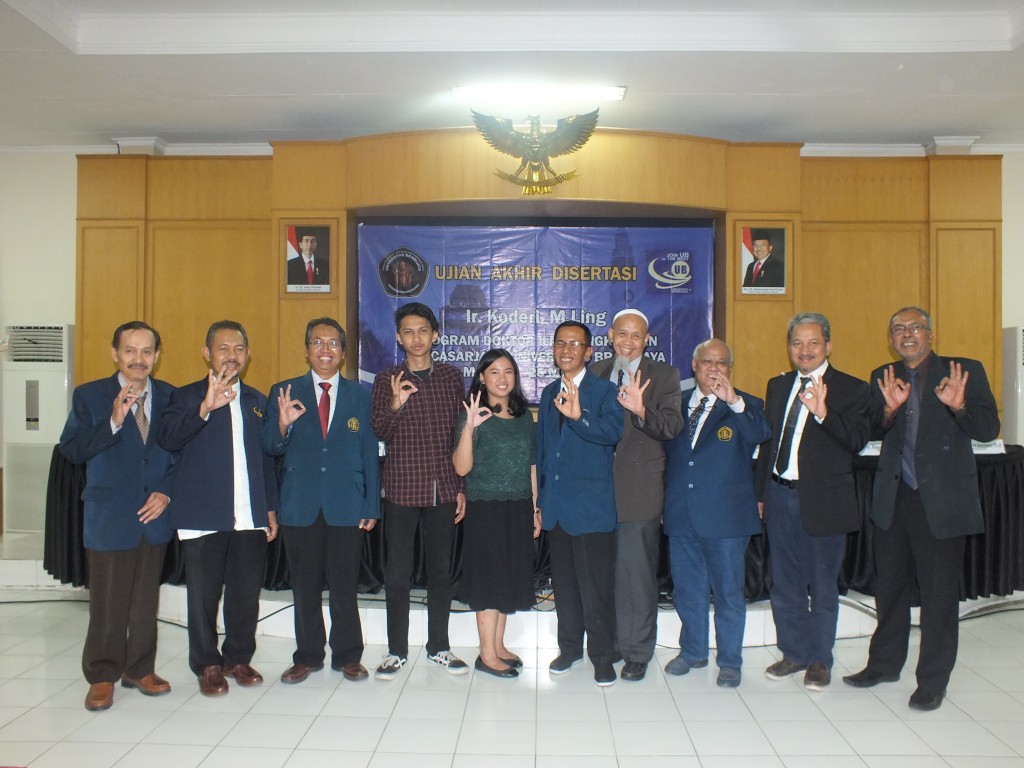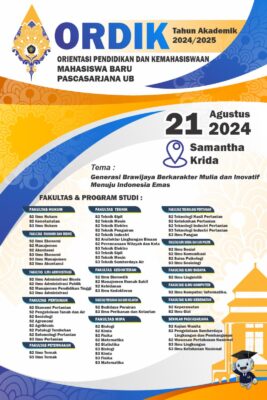Interdisciplinary Quest for Wisdom
FINAL EXAMINATION DISSERTATION – Ir. KODERI, M.Ling
DOCTORAL PROGRAM OF ENVIRONMENT STUDIES
POSTGRADUATE University of BRAWIJAYA
Friday, May 25th 2018
Promotor/Co-Promotors :
- Prof.Dr.Sc.Agr.Ir. Suyadi, MS.
- Dr. Abdullah Said, M.Si
- Dr.Ir. Abdul Wahib Muhaimin, MS
Examiners :
- Prof. Dr. Ir. Soemarno, MS
- Prof. Dr. Ir. Zaenal Fanani, MS
- Dr. Bagyo Yanuwiadi
- Prof. Ir. Joni Hermana, MScES, Ph.D
Title of Dissertation :
Model Of Landfill Management As Educational Tourism Destination: Case Study in Talangagung Landfill, Malang
Summary :
Mostly, landfill management system in Indonesia is still conducted with open dumping system, so it tends to have negative impact to the surrounding environment (land, water and air) such as slums condition, odor, as a vector-borne disease etc. This negative impacts cause the presence of landfill is still not desirable even rejected by the community. How to make a landfill can be acceptable by community still need to be looked for its solutions at that time. One of alternative solution which can be offered is engineering of landfill management system. Landfill management system applied should provide benefit for the environment and community around so the presence of a landfill can be sustained for a long time.
The current condition of Talangagung landfill serves 17 sub-districts in administrative area of Malang regency with the population reach 1,258,112 people in an area of 1313.13 km2. Served landfill area are consisted of three technical unit areas (UPT) namely UPT Kepanjen, UPT Turen, and UPT Bululawang. The volume of input garbage at Talangagung landfill continuously increase. This is evidenced by the increase in garbage volume data doubled in from 2009 to 2016. In 2009, garbage input to this landfill was 114.7 m3/day then it reached to 239.4 m3/day in 2016. Due to the significant increase of garbage input, if the Talangagung landfill is not managed properly then it will have a negative impact on the environment around and it also will affect the occurrence of social conflict with community surrounding. Innovation and landfill management policy based on environmental conservation and education is one of the strategies to reduce the adverse impacts of landfill existence that can be potential to develop.
This research aimed to identify the operational system of waste management in Talangagung landfill, find educational tourism (edutourism) used method in Talangagung landfill as a means of learning behavior change of society toward environmental conservation, analyze the behavior of surrounding communities on the existence of Talangagung landfill as a edutourism destination, determine the model of Talangagung landfill management policy as an edutourism destination. This research used mixed method approach (quantitative and qualitative). Quantitative approach was carried out by using quantitative descriptive analysis and Structural Equation Modeling (SEM), while the qualitative approach was carried out by using SWOT and IFAS-EFAS analysis. SEM analysis was used to assess the supporting factors and correlation on the observed variables namely knowledge, action, perception, attitude of respondents toward applied edutourism method in Talangagung landfill. SWOT and IFAS-EFAS analysis used to evaluate the strengths, weaknesses, opportunities and threats regarding landfill management policy as an edutourism landfll.
At the beginning of Talangagung landfill condition, waste management still used open dumping system there. However, after the issuance of Law number 18 of 2008 on waste management, the current waste management in the Talangagung turned into a controlled landfill. To support the operational activities of landfill management, the availability of facilities consisting of basic, operations, support, and environmental protection facilities were also urgently needed. All these facilities were in compliance with current regulatory standards. In the operational activities of waste management in this landfill, the technical management planning were already prepared by the landfill manager before operational activities were started. Then, it should be certainly conducted and adhered in order to the waste management process well worked.
The management policies implemented at Talangagung landfill were in line with the national policy on waste management. Innovation developed by the landfill manager provided satisfactory results for local governments, managers itself, and communities. One of forms of innovation developed in Talangagung landfill was a methane gas purification system as a result of waste processing activities. This gas processing system had been well integrated and connected to about 260 houses residents around the landfill. This form of innovation could be used as a tool or learning media for the surrounding community regarding good environmental conservation practices. Active learning methods applied by the landfill manager could effectively run and on target because it involved the community or visitors (or tourist) to practice directly.
The existence of communities around the landfill had an important role in supporting the sustainability of educational tourism landfill program proclaimed by the local government. In waste management activities at Talangagung landfill, the community was invited to actively participate together with landfill manager. Regarding of the educational tourism landfill program, the level of knowledge, action, perception, and attitudes of respondents showed a high Likert score, more than 3.4, in all aspects asked to respondents. Over 45% of respondents always responded positively to any questions asked during the data collection process. The respondents’ knowledge, actions, perceptions, and attitudes towards Talangagung landfill as an edutourism destination were in line with the established landfill management policy.
The result of SEM analysis using AMOS 18 showed that Talangagung landfill management was directly influenced by the variable of knowledge, action and indirectly by attitude variable, although with low relation value, <0.7. Currently, the Talangagung landfill position was in growth quadrant based on IFAS-EFAS SWOT analysis. The appropriate management policy strategy for the current Talangagung landfill condition was to utilizing and synergizing maximally the strengths and opportunities available to achieve better management.
Key words: community, management, Talangagung landfill, edutourism



